- Home
- Tiffany Reisz
The Lucky Ones Page 8
The Lucky Ones Read online
Page 8
“Missed you, too,” she said quietly. “Didn’t realize how much until I got your letter.”
“I should have written you a long time ago,” he said. “I talked to Dad about you sometimes. I asked him once if he thought it would be okay to look for you. He said if you wanted us, you’d come back on your own. But you didn’t. I told myself you forgot about us. Better than thinking you hated me.”
“Don’t move,” she said.
“What?”
“Just...stay here.” Allison walked back to the mudroom, grabbed her bag off the hook and pulled out the photograph that she’d kept with her for thirteen years and four moves. She took it back to the kitchen where Roland stood waiting, back against the fridge.
“Here,” she said, and handed him the photograph. “Proof I never forgot.”
He took the picture from her and stared at it. Then he turned and put it on the fridge with a magnet. Then he took his wallet out from his back pocket and removed a photo of his own. It was the missing section of her picture, the torn-off part. With another magnet he put the two halves of the photograph together. Now it was complete. Allison in Roland’s arms, Roland standing next to Deacon standing next to Thora and all of them holding their sparklers together so that the four glowing tips became one.
“You gave me the picture?” Allison asked.
“I guess you really don’t remember anything from that time,” he said. “You were in the hospital and I wanted to go talk to you. Dad had told us you were going home with your aunt when you got discharged so I knew it was probably my last chance to clear the air with you. I waited until after dark and I snuck in to see you.”
Allison looked at him, stunned.
“You were asleep,” he said. “So not a big surprise you don’t remember that. But I talked to you for a long time, anyway. Probably my first confession.”
“What did you confess?”
“I said...” Roland paused. His eyes darkened. “I said I was sorry about what happened between us. I said I wished I’d been at home so I could have helped you when you fell. I said I hoped you’d get to come home to us soon. But if you didn’t, I wanted you to have this picture of us until you could come home again.”
Allison blinked and hot tears fell.
“I wondered where this picture came from,” she said. “I thought your dad put it in my suitcase.”
“I wanted you to remember us,” Roland said. “I should have given you the whole picture but I wanted to remember you, too. Monks don’t carry wallets but I had that picture of you in my prayer book until I left.” He paused and seemed to be deciding if he should say what he said next. “I prayed for you.”
“You did? What did you pray?” she asked, deeply touched. Had anyone else ever prayed for her?
“Nothing big. That you were happy. That you were okay. That you’d come home someday,” he said. “And here you are.”
She touched the photograph where the torn seams met. Seeing the two halves of the picture together again made the old wound in her heart, the one left when she was taken away, ache a little, but the good kind of aching, the kind of aching that meant the wound was healing.
“I’ll stay the night,” she said, smiling through her tears.
“You will?”
“Why not?” she said with a resigned sigh. “One night won’t kill me.”
Chapter 8
Roland insisted on going out to her rental car to bring in her luggage. While he was gone she wandered around the downstairs. The house was neither grand nor intimidating but the signs were everywhere that Dr. Capello had money and lots of it. She’d learned how to spot money from McQueen. His house was beautiful and big but minus obvious ostentation. The really rich people, McQueen had said, are rich enough they don’t have to prove anything. A millionaire will keep a wad of cash in a gold-plated money clip in his Armani suit pocket. A billionaire will show up in jeans with a couple twenties in his faded leather wallet. Now Dr. Capello, she knew, certainly wasn’t a billionaire, but he had enough money he didn’t have to prove anything to anyone. Yet the signs were there. The paintings on the walls weren’t prints but originals with familiar-sounding names inscribed in the bottom right corners—Rex Whistler, Grant Wood, even one O’Keeffe. The furniture was heavy, handcrafted and hand-carved. Nothing from IKEA here. As a child, she hadn’t had the eyes to appreciate the decorative woodwork, the antique mantel clocks, the stained glass transom windows, but her well-trained adult eyes saw it all. She was amazed that a man with Dr. Capello’s wealth had become a doctor when he could easily have lived off his inheritance. Even more amazing that instead of getting married and having biological children, he’d adopted kids out of foster care. McQueen would never have taken in a needy kid. Not unless she was over eighteen and he was sleeping with her.
Roland returned with her suitcase in his right hand and her overnight bag on his left shoulder.
“You okay going upstairs?” he asked.
“I’m fine, I promise,” she said as he led the way. The house was three stories high, and when she’d lived there, all the kids slept on the second floor. Dr. Capello’s office and bedroom took up the entire third floor. They started up the stairs, and Allison clung to the carved banister railing as she followed Roland up.
“I hope Dr. Capello doesn’t have to climb these stairs as sick as he is,” she said.
“He’s been doing it,” Roland said with a touch of awe mingled with annoyance. “Insisting on it. I don’t know how much longer he’ll be able to keep that up. We’ll probably put a bed in the sunroom when he can’t make it to the third floor anymore.”
“It’s been slowly progressing?” she asked when they reached the landing.
“Very slow until recently. Dialysis isn’t working anymore. He’s had too many infections to qualify for a transplant. Last week he threw in the towel. They say kidney failure is one of the most peaceful ways to go. Small blessing. Very small.” He pointed down the hall. “This way.”
The second floor had been the kids’ kingdom during her time here. In her last months here, six kids had divided up four bedrooms and two bathrooms. The girls—Thora, Kendra and Allison—slept on the east side of the house, which Dr. Capello called the sunrise side, and the boys—Roland, Deacon and Oliver—slept on the west side, the sunset side. The boys got the ocean view but the girls got the bigger rooms. A fair trade, Allison remembered thinking.
“Where am I sleeping?” she asked. The second floor looked markedly different than she remembered, which made sense. The kids weren’t kids anymore. No reason for Technicolor paint jobs and skateboards in the hallway, Batman movie posters and swimsuits and towels hanging over the shower rod to dry.
“Over here,” he said, leading her to the corner sunset-side bedroom.
“This is your old room,” she said.
“Yeah, now it’s the guest room.”
“Where do you sleep?” she asked as Roland opened the door and turned on the light.
“For the past couple of weeks, on a chair in Dad’s room.”
Allison walked in and put her bag down on the bed. The room was in a corner of the house with two windows—one facing north to the sparse woods and the other west to the ocean. The ocean-view window was half open to let in the sea breeze, and she was pleased to see a window bench had been added with white cushions and navy blue pillows; a pair of binoculars for bird-watching hung on a hook. She could see herself sitting in that cozy spot and reading all day.
Roland’s old wooden slat bed was gone, replaced with a full-size brass bed with a cream-colored quilt and sea-blue sheets and pillows, a dark blue rug and framed Ansel Adams landscapes on the walls. It was lovely, if a bit generic, like a bed-and-breakfast’s best room.
“Very nice,” she said, hiding her disappointment that so much had changed.
“Thora’s been taking care of the house,” Roland said. “She handled the remodel up here about five years ago. Dents in the walls, scuffs on the floor. There was even
barbecue sauce on the ceiling on Deacon’s side of the room.”
“Wait, barbecue sauce?”
“I mean, we hope that’s what it was,” Roland said. “We didn’t ask.”
“I can’t believe this was your room,” she said, sitting on the bed. “It doesn’t smell like feet.”
“That was Deacon’s fault,” Roland said.
“Liar. I remember your running sneakers. Dr. Capello threatened to call in the hazmat team to decontaminate your closet.”
“Dad.”
“What?”
“You keep calling him ‘Dr. Capello.’ He was your dad.”
“He was my dad,” Allison said. “And you were my brother. You still feel like my brother?”
Roland stood in the doorway, not quite out, not quite in. Even as a boy, he’d had a habit of blocking doorways, filling the frames, reaching up and holding on to the top of the molding to stretch his arms and back.
“I don’t know what I feel,” he said.
“He never did officially adopt me like he did with you and Deacon and Thora,” she went on. “I was just a foster kid he took in.”
“You weren’t just anything. He loved you.”
“I know he did. And he was wonderful to me. That’s why I’m here. I owe him at least this much. A lot more probably.”
“He would say you don’t owe him anything.”
“Well, I do. I loved Aunt Frankie, I really did. But she was seventy-five when I moved in. And it was only me and her and her bridge partners on Tuesday and Sunday nights. Then she was gone and that was it for real family. I almost wish I hadn’t been so happy here. Maybe I wouldn’t have missed you all so much.”
Roland had watched her the entire time she’d been speaking. She didn’t look at him, and gazed instead at the moon dancing over the water.
“You aren’t happy, are you?” Roland asked.
“What?”
“Since the second I saw you, I’ve been trying to put my finger on what’s different about you now. I mean, other than you’re older and taller and prettier.”
She let the “prettier” pass without comment.
“And you figured it out?” she asked.
“Think so. You’re sad. You never used to be sad. Even when you first came here, you weren’t sad. Scared, but not sad.”
She walked over to him in the doorway and let him see her face, her dry eyes, the smile she didn’t have to force around him.
“I’m a little sad,” she said. “But don’t worry. Sad’s the weather, not the climate.”
“Are you sure?” he asked, his voice softer, almost a whisper. She could believe then he’d been a monk. Such a voice surely had God’s ear.
“More mad than sad,” she said. “It’s not fair, you know. I should have grown up in this house.” She turned away from Roland and went to the north-facing window.
The windowsill did double duty as a bookshelf. Old books lined the ledge, novels they’d read in school, tattered paperbacks with pencil markings and yellow highlighting on the pages. Flowers for Algernon, The Island of Dr. Moreau, Frankenstein, Dr. Jekyll and Mr. Hyde. All of Deacon’s twisted sci-fi favorites.
“You think you get used to it, to losing people you love. I lost my mom,” she said. “Lost you all. Lost my...”
“What?”
“My aunt,” she said hastily. “She died a year after I started college.”
Roland nodded but the skeptical look remained.
“You should get used to it,” Allison said. “But you never do.”
“I don’t think you should get used to it,” Roland said. “You’d have to be pretty heartless to get used to something like that.”
“I wish I were heartless some days.”
“Don’t,” he said, and he said it so sternly and sharply she looked up at him in surprise. “Don’t ever wish that.”
He held her gaze and didn’t look away, didn’t let her look away. She couldn’t remember ever seeing him so serious, so solemn.
“You have a good heart,” he said. “A lot of people don’t. You shouldn’t wish a good heart away.”
“You’re such a monk. I was being jaded. Ignore me.”
“Twenty-five is too young to be jaded.”
“I have my reasons.”
Roland waited, sitting on the windowsill. He didn’t need to ask—she didn’t want him to. And yet she suddenly felt the urge to reveal everything.
“I got dumped,” Allison said. “Two days ago.”
Roland’s eyes widened.
“Two days?”
She shrugged. “It happens.”
“How long were you together?”
“Six years.”
Roland looked equal parts amazed and horrified. “Six? That’s longer than a lot of marriages.”
“This was nothing like a marriage.”
“It wasn’t serious?”
“It was very serious,” she said. “Hard to explain. But, if you’re glad to see me, you should be grateful to him. I wouldn’t have been able to come out here if he hadn’t ended things.”
“Well, I am glad.”
She threw a pillow at him.
He caught it deftly and tossed it back onto the bed.
“I mean—I’m not glad you got dumped. That’s brutal. Especially after six years. But definitely glad it brought you here. And you have a free pass to be as jaded and bitter as you want to be.”
“Thank you. I’ll take it,” she said. “Now if you’ll excuse me, I’m on Kentucky time, which means it’s two hours past my bedtime.”
“Tired?”
“A little.”
“Tired tired or tired of me?” he asked.
“Definitely not tired of you. But I am tired. And if I keep talking I’ll talk about things I don’t want to talk about.”
“Then I’ll let you sleep. I’ll crash in Deacon’s room tonight since Dad’s not here. It’s the one right across the hall. If you need anything, knock.”
“Same here.”
They said their good-nights and Allison took a quick shower to get rid of the last of the sand before putting on her pajamas. They were cotton—white shorts and a camisole top—and covered enough skin she wouldn’t feel strange walking around the house in them. She lay in bed and turned off the light—a milk glass lamp with a blue glass shade—and tried to sleep. While her body was exhausted from the time difference and the travel, her mind wouldn’t shut off. Roland a monk. Dr. Capello dying. Kendra and Oliver long gone. McQueen living his new life with his new lady and the baby on the way. Her brain spun like a roulette wheel, and no matter what number it landed on, she lost.
After half an hour, she switched on the lamp again and went to her suitcase to look for a book to read. None of the ones she brought made for good bedtime reading. They were too serious, too scholarly. She needed a comfort read. She got out the copy of A Wrinkle in Time Roland had sent her and started reading it again for the second time that day. She didn’t get very far, two whole pages, when she heard a soft tapping on her door.
“Come in?” Allison said.
“Someone wants to see you,” Roland said, pushing the door open. He was in his pajamas, too. Plaid pants, bare feet, sleeveless T-shirt. He’d shaved, the lack of stubble making him look five years younger. And in his arms he held a cream-colored cat.
“No way,” she said. “Is that Potatoes O’Brien?”
“It’s just Brien now,” Roland said. “We dropped the Potatoes O. I caught him lurking outside your door like a creeper.”
Roland carried the cat over to the bed and sat down with him.
“Can I pet him?” she asked. “Or will he scratch me?”
“Brien doesn’t scratch anybody,” Roland said. “He’s a pacifist. See?” He lifted Brien’s paw and it hung in the air before he dropped it down to his furry belly again. “Pathetic. Grow a spine, man.”
“He’s sweet,” she said, grinning as she petted the old boy, happily sinking her hands into his soft warm fur.
“And old. How old is he now?”
“Dad got him for Deacon for his tenth birthday, I think,”

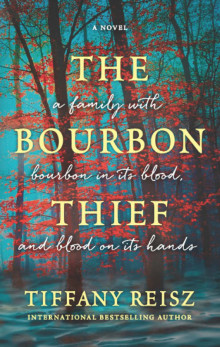 The Bourbon Thief
The Bourbon Thief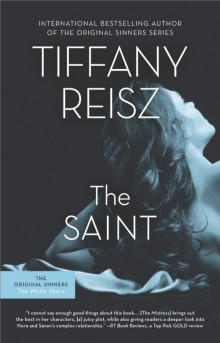 The Saint
The Saint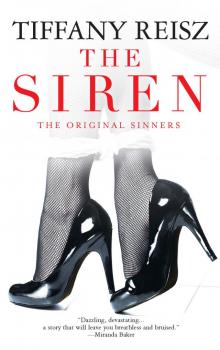 The Siren
The Siren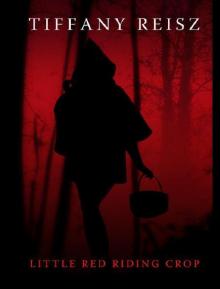 Little Red Riding Crop
Little Red Riding Crop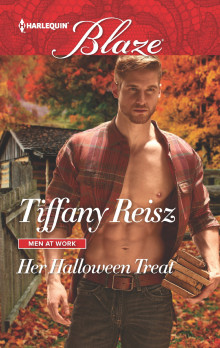 Her Halloween Treat
Her Halloween Treat The Mistress
The Mistress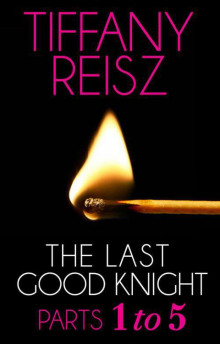 The Last Good Knight
The Last Good Knight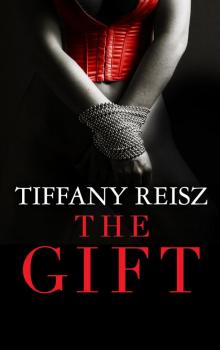 The Gift (Seven Day Loan)
The Gift (Seven Day Loan)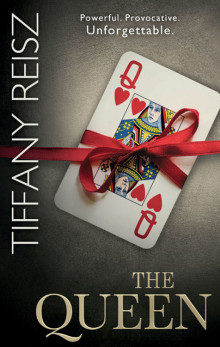 The Queen
The Queen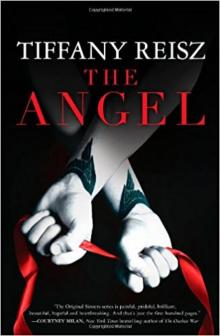 The Angel
The Angel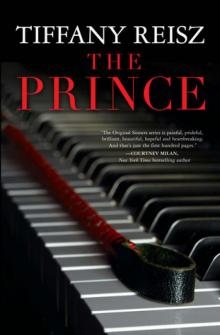 The Prince
The Prince Misbehaving
Misbehaving The Red
The Red Submit to Desire
Submit to Desire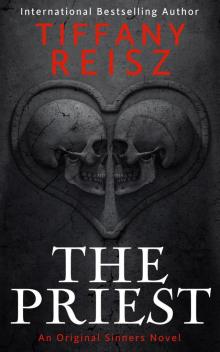 The Priest: An Original Sinners Novel
The Priest: An Original Sinners Novel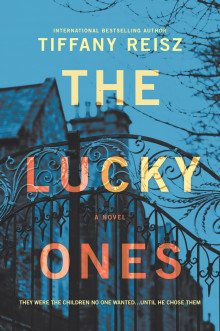 The Lucky Ones
The Lucky Ones The Mistress Files
The Mistress Files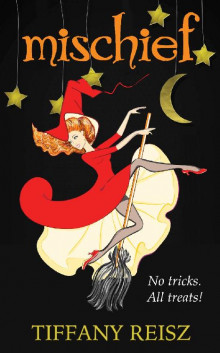 Mischief
Mischief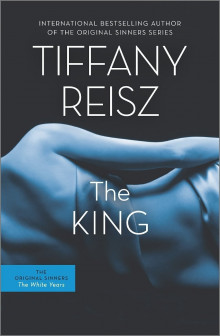 The King
The King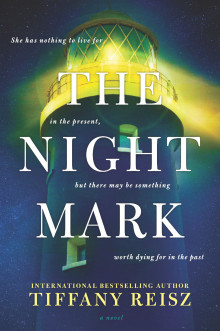 The Night Mark
The Night Mark The Virgin
The Virgin Her Naughty Holiday
Her Naughty Holiday One Hot December
One Hot December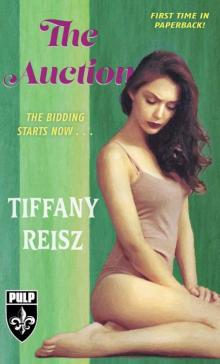 The Auction (The Original Sinners Pulp Library)
The Auction (The Original Sinners Pulp Library) A Winter Symphony: A Christmas Novella
A Winter Symphony: A Christmas Novella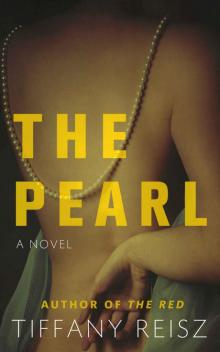 The Pearl (The Godwicks)
The Pearl (The Godwicks)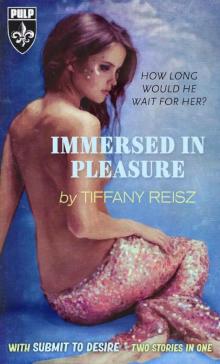 Immersed In Pleasure/Submit To Desire (The Original Sinners Pulp Library)
Immersed In Pleasure/Submit To Desire (The Original Sinners Pulp Library)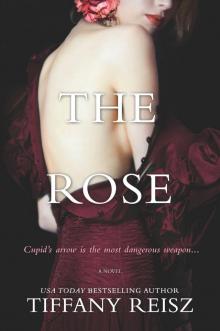 The Rose
The Rose Winter Tales: An Original Sinners Christmas Anthology
Winter Tales: An Original Sinners Christmas Anthology Winter Tales
Winter Tales The Last Good Knight (The Original Sinners Pulp Library)
The Last Good Knight (The Original Sinners Pulp Library)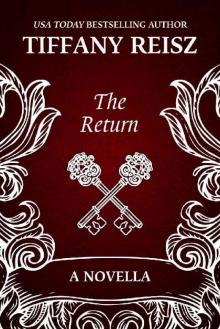 The Return (The Original Sinners)
The Return (The Original Sinners)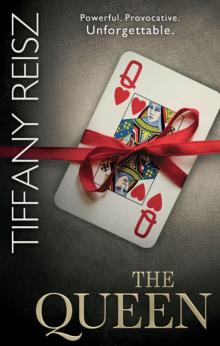 0778318435 (A)
0778318435 (A) Seven Day Loan
Seven Day Loan Picture Perfect Cowboy
Picture Perfect Cowboy The Christmas Truce
The Christmas Truce 10 Shades of Seduction
10 Shades of Seduction The Chateau_An Erotic Thriller
The Chateau_An Erotic Thriller The Christmas Truce: An Original Sinners Novella
The Christmas Truce: An Original Sinners Novella Immersed in Pleasure
Immersed in Pleasure Harlequin E Shivers Box Set Volume 4: The HeadmasterDarkness UnchainedForget Me NotQueen of Stone
Harlequin E Shivers Box Set Volume 4: The HeadmasterDarkness UnchainedForget Me NotQueen of Stone Something Nice: An Original Sinners Novella
Something Nice: An Original Sinners Novella The Confessions
The Confessions The Mistress Files: The Case of the Acting ActressThe Case of the Diffident DomThe Case of the Reluctant Rock StarThe Case of the Secret SwitchThe Case of the Brokenhearted Bartender
The Mistress Files: The Case of the Acting ActressThe Case of the Diffident DomThe Case of the Reluctant Rock StarThe Case of the Secret SwitchThe Case of the Brokenhearted Bartender One Hot December (Mills & Boon Blaze) (Men at Work, Book 3)
One Hot December (Mills & Boon Blaze) (Men at Work, Book 3) The Scent of Winter: A Novella
The Scent of Winter: A Novella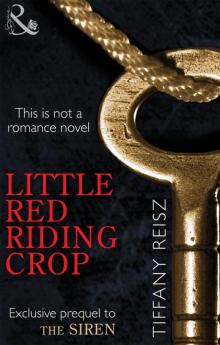 Little Red Riding Crop (Spice) (Prequel to The Siren: Book 1 in The Original Sinners series)
Little Red Riding Crop (Spice) (Prequel to The Siren: Book 1 in The Original Sinners series)